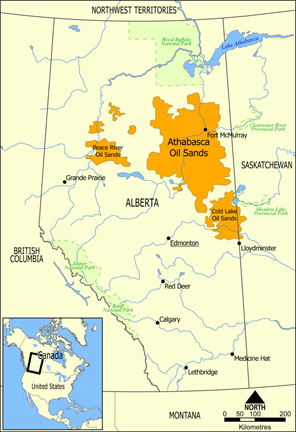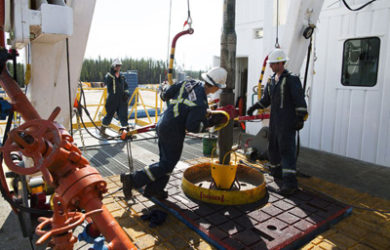Guest blog by Alice Zhu.
 When we hear the words “oil sands,” a lot of things come to mind. Environmental disaster is one. Evil is another. Some people think it is a conspiracy by the Liberals. In environmentalists it can trigger a range of emotions, from hatred to disappointment to grief.
When we hear the words “oil sands,” a lot of things come to mind. Environmental disaster is one. Evil is another. Some people think it is a conspiracy by the Liberals. In environmentalists it can trigger a range of emotions, from hatred to disappointment to grief.
In reality, the oil sands are a major source of income for Albertans and a major export for the country as a whole. Whether we like it or not, all Canadians share responsibility for the continued extraction of oil sands energy — not Albertans alone.
Scientists warn that continuing to invest in oil will prevent us from meeting the greenhouse gas emission reduction targets agreed on at the Paris climate talks in December of 2015. Indigenous groups across the country have protested against the construction of pipelines through their land. There is evidence that the oil sands and pipelines have disastrous consequences for our environment and especially for indigenous populations living close to the land. So why is the Prime Minister supporting their expansion? Perhaps there is a flip side to this story.
Whether we like it or not, all Canadians share responsibility for the continued extraction of oil sands energy.
Only recently have I considered the oil sands from another perspective. A friend of mine who lived in residence with me at Massey College is originally from Alberta, and moved to Toronto to pursue postgraduate studies. When we began chatting about climate change and pipelines, he immediately sensed my negativity towards Albertans and the oil sands.
My friend told me that he was used to non-Albertans feeling hatred or contempt towards the oil sands industry for making climate change worse. However, he said, Canadians tend to forget that we are all consuming fossil fuels, of which the oil sands are one source, so we are also a part of the problem.
In Alberta, the oil sands are considered the most important sector of the provincial economy. They have created many jobs for new immigrants as well as established residents, and are often seen as a symbol of Alberta. It is similar to the hydroelectricity industry of Ontario. Each province has its unique resources, and for Alberta it is the oil sands. It just so happens that this resource is not climate-friendly and as a result the rest of the country is pointing fingers at Albertans for making use of this resource to make a living.
In the end, we still need solutions.
Canadians’ high standard of living entails the consumption of a great deal of energy, much of which still comes from fossil fuels. So why is Alberta being singled out for blame for the oil sands? Simply because it is easy to forget that although the suppliers make the product, it is consumers who create the demand in the first place. We, Canadians, are the ones reaping the rewards from the oil sands.
In the end, however, we still need solutions. It is because we lack a national climate strategy that we are not making the change from oil sands to green energy. This is something that the federal government must act upon immediately. We need more investment in renewable sources of energy in Canada, and most importantly, we need governments to insure a just transition, providing skills training and resources, so that workers displaced by the shutting down of the fossil-fuel industry can transition to clean jobs and not be left behind. These are the kind of actions that need to be taken – the kind of solutions we need. Throwing blame at the workers who are producing this energy does not solve anything. It makes the problem worse by isolating one province from the rest of the country. Recognizing the importance of the oil sands to Albertans and respecting their way of life will help to unite the country and make further headway toward a national climate strategy that benefits all of us.
At the end of the day what we truly need is a change in perspective – an open mind – to those workers who are trying to make a living like everyone else. A change in thinking can go a long way.
Alice Zhu is a Master’s Student in the Department of Ecology and Evolutionary Biology,
University of Toronto
